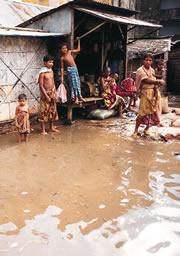 Natural disasters are already on the increase in some parts of the world.Punchstock
Natural disasters are already on the increase in some parts of the world.PunchstockClimate change is having an impact now on our planet and its life, according to the latest instalment of a report published by the Intergovernmental Panel on Climate Change (IPCC). And the future problems caused by rising seas, growing deserts and more frequent droughts, all look set to affect the developing world more than rich countries, they add.
The report, unveiled at a meeting in Brussels, Belgium, is the second chapter of the IPCC's Fourth Assessment — the most comprehensive summary yet of research into the causes and effects of climate change.
The first chapter, released in February, dealt with the causes of climate change, and concluded that global warming is very likely (with a greater than 90% probability) to be attributable to human activity such as fossil-fuel burning. The new chapter, entitled 'Impacts, Adaptation and Vulnerability', details exactly what climate change is doing to the planet — and who is likely to suffer most.
"People who live in the least developed countries, the small island developing states, Asia's vast river deltas and most African nations are most vulnerable," says Saleemul Huq, one of the report's lead authors and head of the climate-change group at the International Institute for Environment and Development in London.
Today's problem
The report also provides the most up-to-date view of how climate change is affecting the incidence of extreme weather events. It is the first IPCC assessment to use real observations of Earth's climate, rather than computer projections, to show how the situation is changing.
"It is impossible to say with certainty that climate change is the cause of any single hurricane, heat wave, flood or drought," Huq says. "But taken together, the increase in frequency and intensity of such events during the last decade of the twentieth century provides strong evidence that climate change is already occurring and is no longer a problem of the future."
Since the publication of the previous IPCC assessment report, in 2001, much more evidence has emerged that man-made global warming is having a noticeable effect on physical and biological systems all over the world, the report's authors say. Out of more than 29,000 sets of observations, of things such as species distributions and drought incidence, more than 85% changed in a way that matched their predicted behaviour in response to global warming.
The report's authors also mapped the locations of these physical and biological systems against where observed warming has occurred. This shows, they say, that many of these natural systems are being affected specifically by regional climate changes — particularly temperature increases.
Many economic analyses have also suggested that climate change is having an impact. Robert Muir-Wood, one of the report's authors and chief research officer of Risk Management Solutions, a UK-based risk-modelling company, says that financial losses from weather-related catastrophes have increased by an average of 2% per year since the 1970s, even when changes in wealth, inflation and population growth are taken into account.
Growing yields
The report does offer some good news: global warming is set to increase crop yields at higher latitudes, such as in northern Europe, as long as temperature increases remain less than 3 ºC. But in the tropics, crop yields look set to fall even with modest warming, and the burden of diseases such as malaria is expected to rise.
The growing risk of climate disturbances such as drought and floods suggests that those living in dry or low-lying areas have most to fear. The report's authors conclude that investment in sustainable development for poorer nations — including measures such as disaster-proof land-use plans and improved flood-warning systems - is essential.
ADVERTISEMENT
But the overall cost of climate change remains very unclear. The report says that responding to these growing challenges could cost something like US$12 for every tonne of CO2 added to the atmosphere. But it adds that there is a huge range of estimates for this number; some predict a cost in the hundreds of dollars per tonne, whereas others actually predict a financial boon from emissions. These estimates depend on the amount of warming that actually occurs in the future, which is still in itself very uncertain.
Visit our ofclimatechangetall.html">newsblog to read and post comments about this story.
